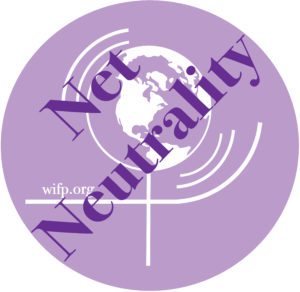Dr. Donna Allen’s Life Work
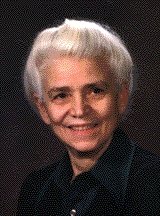
Donna Allen, born August 19, 1920, would be 100 years old if she had lived this long. Donna, who founded the Women’s Institute for Freedom of the Press in 1972, had a remarkable ability to analyze issues, to articulate that analysis, and to transform her ideas into practice.
For Donna, the most important issue to address was how to develop a viable communication system in which all people have the opportunity to speak for themselves, reaching the widest possible audience. Equality of outreach is a crucial element of media democracy. If some people (or conglomerates) can reach the majority of the population out of proportion to other voices, this power imbalance can make it difficult, if not impossible, to have a true democracy.
Currently in the U.S. just five conglomerates reach over 90% of the population. The majority of the people in the U.S. have no means to get their information out to that many people to counter such power.
These issues drove Donna to examine the current media system and formulate ideas about what is needed in order to truly develop a communications structure where everyone who chooses to, can communicate their information, perspectives, and ideas relatively equally. Her recognition that media democracy specifically is critical for true democracy and for justice for everyone. She developed a media philosophy to aid us in that direction. Her life of activism helped her see what needs to be done for a radical restructuring of the communications media in order to obtain media democracy.
Donna Allen’s Early Activism
Donna, an economist and author, had an intelligence that analyzed what was going on around her and motivated her to activism. In 1947, Donna did support work in the Chicago area for Highlander Folk School of Monteagle, Tennessee, a pioneering effort in integration and education of Southern workers, and drove down to Highlander in July of that year. She was active in the Progressive Party.
Donna was deeply involved in the field of labor relations. She did economic research for various trade unions, including the American Federation of Labor Metal Trades Department. As an employee of the National Labor Bureau in 1948 she did research for the Railway Brotherhoods. In 1949, having been appointed by President Truman to the Presidential Emergency Board, she heard emergency cases in industrial relations.
From 1953 through 1955, Donna taught at Cornell University’s School of Industrial and Labor Relations. Her political activism intensified during this time. Donna worked passionately on the campaign to defend the innocence of Ethel and Julius Rosenberg and to prevent their execution as spies. In 1953 she worked against the Central Intelligence Agency involvement in overthrowing the newly elected government in Guatemala. Donna also became active in the League of Women Voters’ Freedom Agenda Study Project. She participated in its workshops on such topics as government loyalty oaths and freedom of expression.
After moving to Washington, DC, Donna took her children to join her in demonstrations against the Pentagon to prevent the U.S. from trying intervene in the Cuban revolution, threatening invasion. She also involved her children in picketing the DC area amusement park, in Glen Echo that did not admit black families. The demonstrations were effective in opening up the park in 1961.
Peace and Disarmament
Peace and nuclear disarmament were of prime importance to Donna. In 1959 she began working with the Women’s International League for Peace and Freedom (WILPF) and the National Committee for a Sane Nuclear Policy. She joined their efforts to inform the public how dangerous nuclear weapons build policies were, and how crucial it was to prevent the spread of nuclear weapons. She became a member of the national Legislative Committee of WILPF and later served as the committee’s chair, as well as being a member of the WILPF National Board.
In 1960 she joined the staff of Vermont Congressman William H. Meyer to assist in the fight he had initiated in Congress against extension of nuclear weapons to Germany. She also worked on his campaign for re-election, writing campaign brochures and fliers, and even made a trip to Vermont to explain the congressman’s votes on the nuclear issues.

In the fall of 1961 when the United States and the Soviet Union ended their moratorium and resumed nuclear testing in the atmosphere, Donna was among those who founded Women Strike for Peace (WSP), an organization that began with a national protest by women on November 1, 1961. Donna led the delegation that day to the Soviet Embassy in Washington, DC. Another delegation led by Dagmar Wilson of WSP in Washington went to the White House.
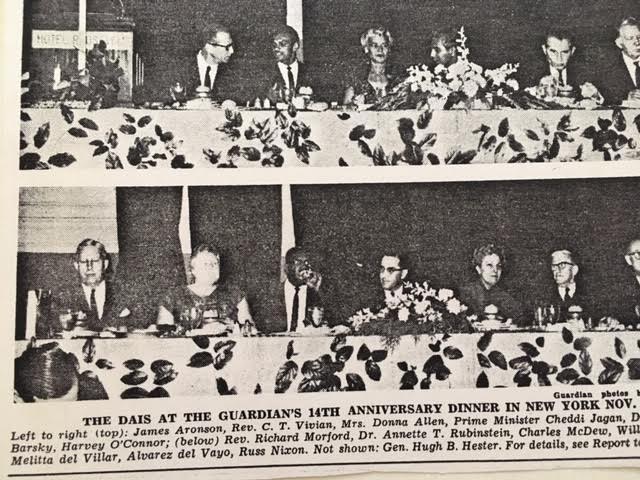
She is seated between Rev. C.T. Vivian and Prime Minister Cheddi Jagan
To combat the efforts made to silence First Amendment freedoms of speech, press, assembly, and petition, in 1961, Donna helped to organize a local Washington Area Committee to Abolish the House Un-American Activities Committee.
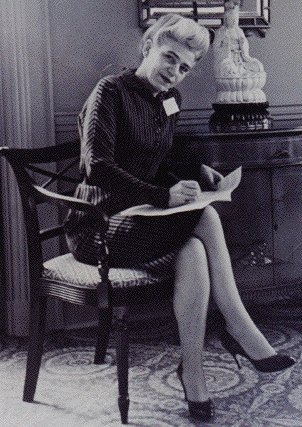
Between 1961 and 1964, Donna, who had an MA in economics, wrote about the economics of disarmament. She was a delegate to the annual meeting of WILPF in 1962. She testified before Congress and at national and international conferences, such as the International Arms Control and Disarmament Symposium in Ann Arbor, Michigan, in January 1964, and in December 1964 at the Conference on Economic Aspects of Disarmament in Vienna, Austria. After the Vienna conference, she went to Paris, France, where she joined a 15-nation European demonstration against a nuclear North Atlantic Treaty Organization and was arrested. She and the others who were arrested spent some six hours in a French jail. She spoke at that evening’s rally, sharing the spotlight with Eve Curie and other notables, before an audience of thousands.
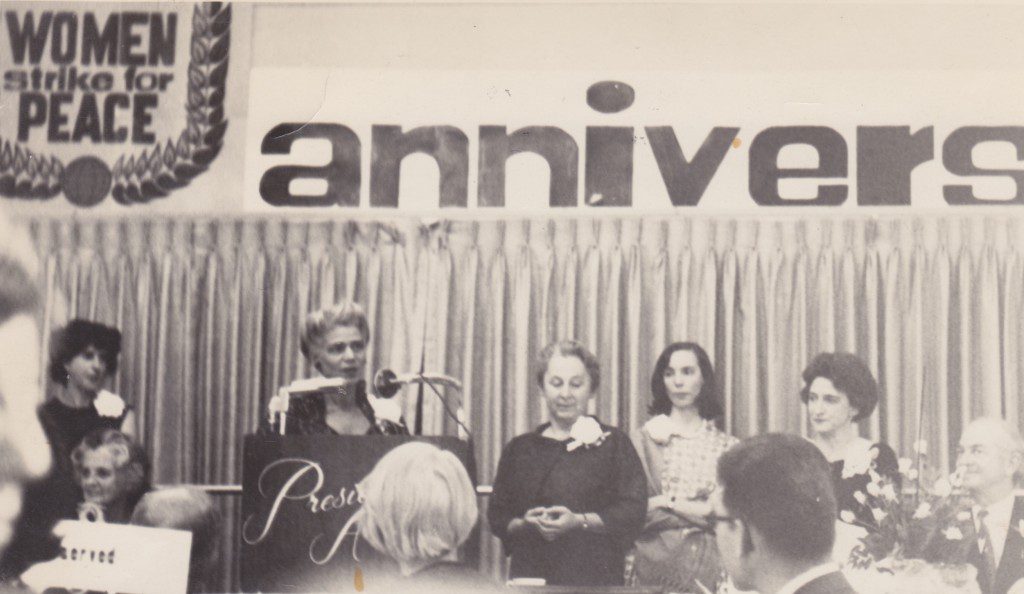
Donna Takes On HUAC
On November 19, 1964, Donna, along with Dagmar Wilson, and Russ Nixon, general manager of the National Guardian in New York, received subpoenas to testify before the House Un-American Activities Committee (HUAC) in Executive Session. They were to be questioned in secret in connection with visits they had made to the State Department in 1963 to urge that an entry permit be granted to a Japanese peace movement leader who was scheduled to give a 10-day lecture tour in the United States. The State Department in fact granted his request for a visa.
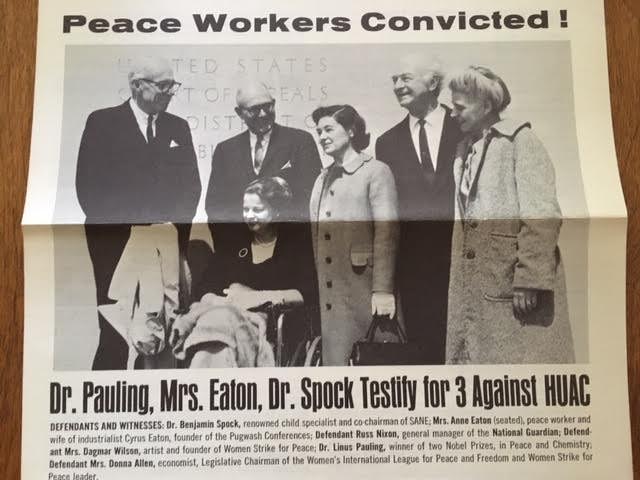
All three refused to testify before HUAC in secret session and demanded that the press and public be admitted to the hearing room. At a meeting of four HUAC members, the committee refused to grant open hearings and later voted to recommend contempt citations. Donna Allen, Dagmar Wilson, and Russ Nixon were cited for contempt of Congress, tried in federal court on April 7, 1965, and convicted and sentenced on June 4. In early December 1965, Donna began working as the Washington Representative for the National Committee to Abolish HUAC.
A support group of prominent Americans was established called Defenders of Three Against HUAC. Several members of the group testified at their trial. After much publicity, speaking tours, and media appearances, the conviction was overturned in the Court of Appeals on August 2, 1966.
Donna’s work in Washington with the National Committee to Abolish HUAC was a key factor in the abolition of HUAC in 1975.
National Leader for Peace and Justice
In 1965, combining her commitment to civil rights and her opposition to the war in Vietnam, Donna wrote, published, and distributed thousands of copies of a publication entitled What’s Wrong With the War in Vietnam.
Donna had become a national leader in the anti-war movement. She traveled across the country several times speaking in numerous cities. She regularly spoke at rallies on the East coast. In 1965, for example, she addressed the Vietnam Peace Parade in New York City and a 1966 rally in Philadelphia. In July 1967, she was featured at an all-day peace workshop for women in the gardens of Dr. Linus and Ava Helen Pauling in California. Malvina Reynolds, a Berkeley-based internationally known composer, guitarist, and singer of peace songs, performed at the program. In May 1969, Donna, Julian Bond, and others spoke at a rally for peace and justice in Pittsburgh.
Donna took part in many joint efforts on behalf of peace and justice issues. In August 1965, she was one of 31 individuals who called for and organized the Assembly of Unrepresented People. She was active with the International Days of Protest, Mobilization to end the War in Vietnam, the Fort Hood Three, Vietnam Summer, Tri-Continental Information Center and the October 21, 1967, demonstration at the Pentagon. Donna was an organizer for the Jeannette Rankin Brigade, held in January 1968, and in June 1968 for the Poor People’s Campaign. She worked with the civil rights movement in its efforts to win political recognition for blacks in state and national electoral politics.
Increasing Emphasis on Media Democracy
From 1967 onward, Donna focused increasingly on media democracy issues. Newly elected to the Board of Directors of the National Conference for New Politics, Donna spoke at its major convention in Chicago in September 1967. Several thousand people attended this convention. Donna gave her talk on the issue of the media. A photo of her on the speaker’s platform with Dr. Benjamin Spock, Reverend William Sloan Coffin, Jr. and Dick Gregory, appears in Gregory’s book Write Me In!, published in 1968 when he ran for president as a write-in candidate.

From then on her speeches were all focused on the role of mass media. She gave media-related speeches at peace demonstrations in Washington, the Jeannette Rankin Brigade in January 1968, and at the Peace and Freedom Party convention in New York in 1968. “I had come to the conclusion,” she wrote, “that even when using all forms of communication that we could devise, and despite great numbers, we still could not match the number of people that the relatively few mass media owners could reach with their information and opinions.
“It was more than clear to me out of my experience that their vastly superior ability to reach the majority of the public 24-hours a day gave them the power to disseminate name-calling and successfully persuade the public not to listen to our information, opinions and facts. Their news stories gave little or no space to the message our activities were trying to convey but a great deal of space for attacks on us … Mechanics of demonstrations, numbers of people, police actions, were reported but not our message. These media were not ‘our free press’; they did not speak for us or report our news. Our press conferences were usually ignored, and when they weren’t the coverage was often derogatory.”
In July 1968, Donna published an article in The Liberated Voice, Syracuse, NY, entitled “Up Against the Media. In this article she critiqued the media, discussing its concentration in the hands of a few and its effect on democracy. Donna documented the concentration of ownership in print, radio, television, and in the news services. She wrote about how the mass media silenced criticism of the status quo and of U.S. policies.
On May 24, 1969, Donna gave a speech titled “The Mass Media Monopoly” at the March and Rally for Peace and Justice in Pittsburgh. Donna talked about the consolidation of media ownership in fewer and wealthier hands. She described the history of the press in America. She discussed how profitable media ownership is and how the media networks own other businesses, including those with war contracts. “At what point will we begin to do something about it?” she asked. “I suggest that the time is now.”
The Southern Conference Educational Fund reprinted her “Mass Media Monopoly” speech entitled “So You Think You Have a Free Press?” The pamphlet was published in January 1970 when one of Donna’s daughters was jailed on a free press case while active in the southern civil rights movement.

In 1968 Donna organized a media group called American’s for Equal Access to the Media. She had to take time out to revise her book on fringe benefits for a second edition and the group was not strong enough to survive without her attention. In the meantime she had done more thinking and, by early 1972, she knew that the organization that was needed would have “women” in the title. Experience told her that it would be primarily women who would expand freedom of the press to those who did not have it. Most men resisted the ideas she discussed and tried to argue with her. Women, on the other hand, responded enthusiastically, and seemed to understand the need for people to be able to speak for themselves, rather than have others portray them. Donna also chose to omit the word access in the name because she did not want to imply in any way that the solution to lack of media democracy is access to anyone else’s media. In 1972, WIFP was born.
Women’s Institute for Freedom of the Press
While working to abolish HUAC, Donna had enrolled at Howard University in Washington, DC. In 1971, she added a Ph.D. in history to her M.A. in economics. By 1972 she was ready to embark on her life’s work fighting for media democracy, the work of the WIFP. Eager to let others know “what women are doing and thinking about the communications media,” she immediately began publishing Media Report to Women.
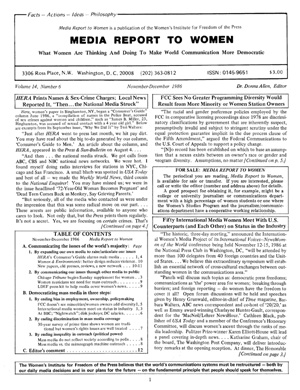
In addition to the monthly report, WIFP published other publications including Women in Media: A Documentary Source Book, and an annual Directory of Women’s Media. Donna also collaborated with other women to write books in the field of communications.
Donna and WIFP organized a series of annual conferences with ambitious goals to increase communications among women. The seven conferences were titled the Annual Conference for Planning a National and International Communications System for Women. The first six of these were held at the National Press Club in Washington, DC, which had just admitted women to membership.

Each year the attendance at the conferences grew. The 1982 conference was attended by 124 women from 32 countries. These conferences stimulated ideas abou what needed to be done to increase communication among women and bring women’s voices to the public. Many projects were born, including some using sophisticated technology to communicate women’s messages.
In 1980 at the annual conference, Donna and WIFP launched one of the most ambitious communication technology projects, a satellite teleconference. This 4-hour international interactive teleconference by satellite between the Second United Nations World Conference on Women in Copenhagen, Denmark, was an historic event. Five years later, during the United Nations World Conference on Women in Nairobi, Kenya, WIFP organized the satellite teleconferences again, this time including several other countries.
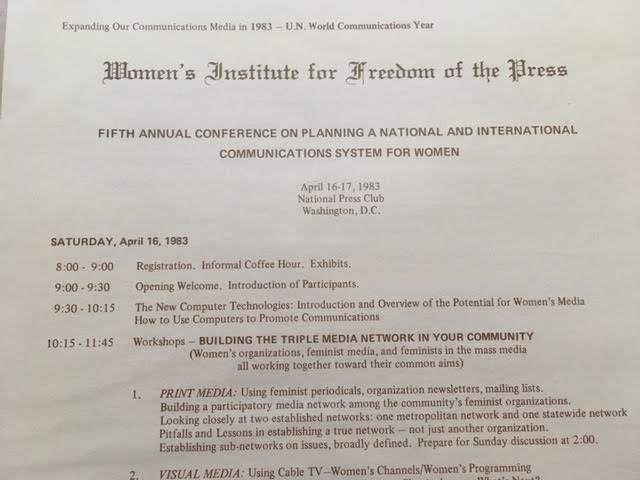
As a result of her work over the years she received recognition from many groups. For example, in 1979 Donna won the Headliner Award, the highest award bestowed by Women in Communications. Inc. At the 28th annual Broadcast Industry Conference meeting in San Francisco in 1980, Donna received the Broadcast Preceptor Award for leadership in extending First Amendment guarantees to women. In 1983 she won the Wonder Woman Award from the Wonder Woman Foundation.

Donna worked tirelessly to develop her ideas and philosophy on the creation of a democratic communications system. Her media philosophy contains many straightforward ideas that can be applied to analyze how we might get closer to media democracy. One such issue is the importance of people being able to communicate their information directly to others without having to request inclusion in someone else’s media. Although equality of outreach is also an important issue, without being able to communicate your message directly, distortions and inaccuracies will continue to occur. She was an advocate for women utilizing electronic media in the early days of the Internet.
Donna always believed strongly that working on democratic media issues is necessary to bring about the changes that she felt are needed in the world. The WIFP continues to utilize her ideas of how we head toward a democratic media system and to share this media philosophy with others in this endeavor.

To get all the things done that she envisioned, Donna rose at 4 am and was active until 10 pm. She loved the early hours because she was able to get so much accomplished before the phone started ringing and the day’s activities began.
 The Women’s Institute for Freedom of the Press
The Women’s Institute for Freedom of the Press